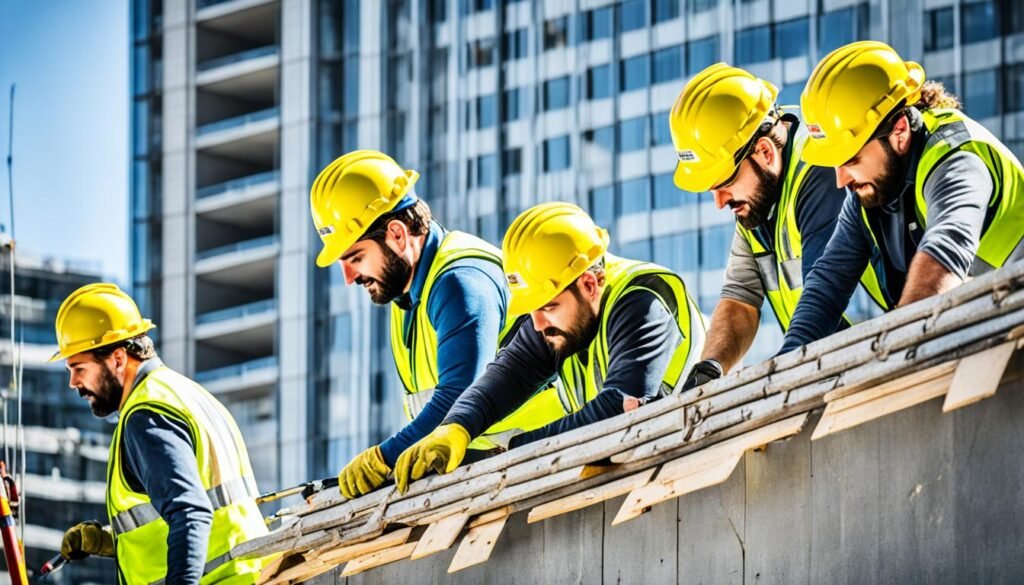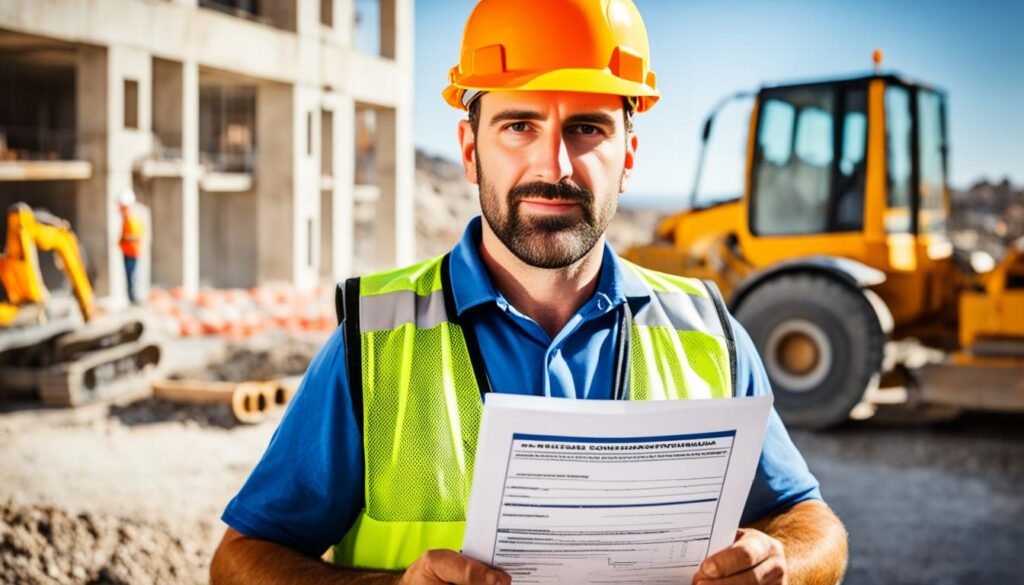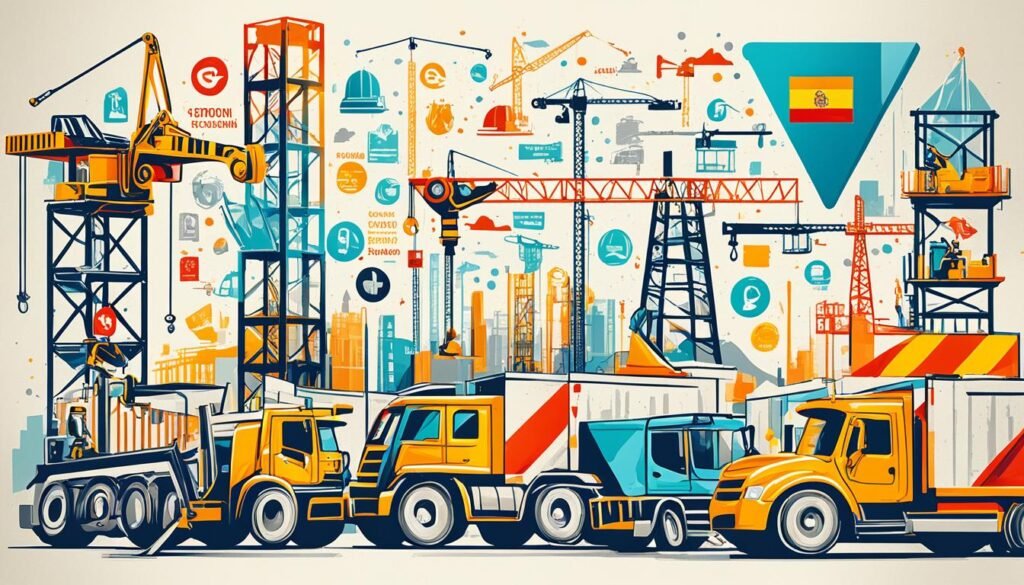Requirements to Work in Construction in Spain

Picture a busy construction site in Madrid's heart, where skilled workers work together to change the city's skyline. The Spanish construction industry is booming, and there's a big need for skilled people. If you're an experienced worker or want to start, knowing the legal stuff and what you need is key to doing well.
This guide will cover the main things you need to know if you want to work in Spain's construction industry. We'll talk about what you need to work in construction in and the many jobs you can find. We aim to give you the info you need to move your career forward.
Construction Employment Landscape in Spain
Spain's construction industry has seen a big comeback in recent years. This is thanks to more infrastructure spending, city development projects, and a growing need for homes. These factors have opened up many job opportunities in project management, engineering, skilled trades, and general labor.
Booming Construction Industry
The construction sector in Spain is a big deal, making up about 7% of the country's GDP. By 2021, it had around 1.2 million workers, which was a 3.2% jump from the year before.
Diverse Job Opportunities
- The Spanish construction field has a mix of regular workers and those who work for themselves. This means there are many job options available.
- But, there's a shortage of skilled workers. So, there are efforts to draw in more young talent and improve training to meet the demand.
- Jobs in construction in Spain vary a lot. You can find work in project management, engineering, skilled trades, and general labor.
"Spain's construction industry has experienced a significant resurgence in recent years, driven by factors such as increased infrastructure investment, urban development projects, and a growing housing market."
The construction boom in Spain has created many job opportunities. It draws in both skilled pros and beginners. With the sector growing, the need for skilled workers is expected to stay high. This offers great chances for those looking for construction jobs.
Essential Legal Requirements
Foreign nationals wanting to work in Spain's construction industry must first understand the legal steps. They need to get work permits, visas, set up residency, and meet tax rules. These steps are key to smoothly entering the Spanish job market.
Work Permits and Visas
Getting the right work permits and visas is a big step for construction workers in Spain. Work permits for construction in Spain are given to those with special skills or qualifications. Visas for construction workers in Spain depend on where the worker comes from and their job type.
Getting these permits and visas can be hard. Workers should research the rules and apply correctly to avoid problems.
Residency and Tax Obligations
Workers also need to meet residency requirements for construction workers in Spain. This means having a valid address and the right residency permit or visa. Not following these rules can lead to fines or even being sent back home.
Workers must also handle tax obligations for construction workers in Spain. This includes paying taxes and social security. Not paying these can cause financial trouble and legal issues.
Knowing these legal steps helps workers move into the Spanish job market smoothly. It helps avoid problems and makes sure they follow the law.
construction employment requirements Spain
Getting a construction job in Spain is more than just about the law. You need the right qualifications and skills to do well. Employers want people who can bring their knowledge and skills to the table. This makes the industry exciting and challenging.
To get a construction job in Spain, you should have:
- Educational Credentials: A degree in civil engineering, architecture, or construction management is important. Many employers want people with university degrees or vocational certificates in these areas.
- Technical Skills: Knowing how to use construction tools, read blueprints, and build things is key. Employers like people with experience or training in carpentry, masonry, electrical work, or plumbing.
- Project Management Abilities: Being able to lead teams, manage time, and handle project details is important. Employers look for people who are organized, can solve problems, and make good decisions.
- Language Proficiency: Speaking Spanish is a must for construction jobs in Spain. Knowing English or other languages is also helpful, especially for international projects.
- Safety Awareness: Knowing about construction safety and following health and safety rules is crucial. Having safety certifications or training can give you an edge.
Meeting these requirements can help you succeed in Spain's construction industry. It's a great time to join, with many projects underway.
"The construction industry in Spain is experiencing a remarkable resurgence, offering a wealth of opportunities for skilled professionals who can meet the evolving needs of this dynamic sector."
Education and Training
The Spanish construction industry values formal qualifications and specialized training. Aspiring workers can choose from apprenticeships, technical schools, and university programs. These include fields like engineering and architecture.
Formal Qualifications
Many start with vocational training programs called Formación Profesional (FP). These programs give practical training in trades like carpentry, masonry, and plumbing. They last one to two years and end with a recognized qualification.
Spain also has university degrees for construction, such as Grado en Ingeniería de Edificación and Grado en Arquitectura. These degrees offer a deeper understanding of construction, design, and project management.
- Construction education in Spain emphasizes formal qualifications and specialized training
- Vocational training programs (FP) offer hands-on, trade-specific education
- University-level programs in engineering and architecture provide a more comprehensive, theoretical approach
"The Spanish construction industry is committed to investing in the education and training of its workforce, ensuring that workers have the necessary skills and knowledge to meet the industry's evolving demands."
Language Proficiency
For construction jobs in Spain, knowing Spanish well is key. Workers must communicate clearly on the job to coordinate tasks, follow safety rules, and work with others. Employers want workers to speak Spanish well, both in writing and talking.
To get ready for construction jobs in Spain, improve your Spanish skills. You can use language courses, immersion, or study on your own. Many schools and online sites offer classes made for construction workers.
Some jobs also need workers to know special words and terms about construction. This includes learning technical terms, how to build things, and safety rules in Spanish.
- Knowing Spanish well is key for talking on construction sites in Spain.
- Employers look for strong Spanish skills in both writing and speaking.
- Language courses, immersion, and self-study can boost your Spanish skills.
- Some jobs also require knowing special construction words and terms.
Showing you're good with Spanish can make you more attractive to employers. This can open up more job chances in Spain's growing construction field.
Professional Certifications
In Spain's busy construction world, workers often need to get different professional certifications and trade-specific licenses. These show their skills and are key to getting jobs in the country's booming construction field.
Trade-Specific Licenses
Construction workers in Spain may need certain licenses for their trade or role. These licenses cover things like electrical work, plumbing, welding, and using heavy machinery. To get these licenses, workers must pass exams and meet certain education and experience standards.
- Electrician License: Allows individuals to perform electrical installations and maintenance work in accordance with national safety standards.
- Plumbing License: Enables workers to design, install, and maintain plumbing systems in compliance with local building codes.
- Welding Certification: Certifies that workers have the necessary skills and knowledge to perform various welding techniques safely and effectively.
- Heavy Machinery Operator License: Permits the operation of construction equipment such as cranes, forklifts, and excavators, ensuring the safety of both workers and the public.
It's important for construction workers in Spain to keep up with the latest construction certifications in Spain and construction licenses in Spain. This helps them stay competitive in the job market and succeed in their careers.
Health and Safety Regulations
Keeping construction workers safe in Spain is crucial. It's not just the law, but also a duty to protect workers. This section covers the main health and safety rules for construction pros in Spain.
Wearing the right personal protective equipment (PPE) is key. Workers must have hard hats, safety boots, and high-visibility vests on site. Employers must give out the PPE and make sure it's used right.
Construction sites in Spain also follow strict safety rules. These include emergency plans, safe work methods, and training for workers. Regular checks and safety reviews are done to make sure these rules are followed and to spot any dangers or areas to improve.
If you want to know other articles similar to Requirements to Work in Construction in Spain You can visit the category Jobs.



Leave a Reply